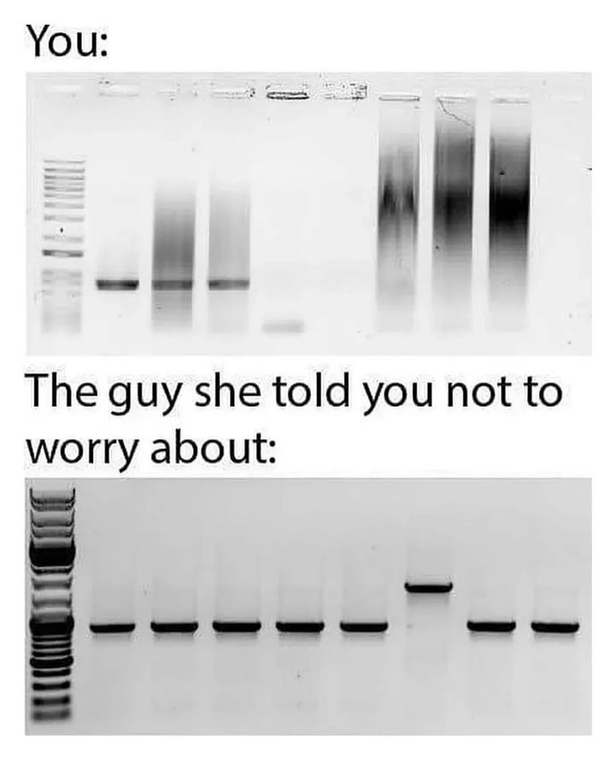What exactly is this? I'm no man of science aha
Science Memes
Welcome to c/science_memes @ Mander.xyz!
A place for majestic STEMLORD peacocking, as well as memes about the realities of working in a lab.

Rules
- Don't throw mud. Behave like an intellectual and remember the human.
- Keep it rooted (on topic).
- No spam.
- Infographics welcome, get schooled.
This is a science community. We use the Dawkins definition of meme.
Research Committee
Other Mander Communities
Science and Research
Biology and Life Sciences
- !abiogenesis@mander.xyz
- !animal-behavior@mander.xyz
- !anthropology@mander.xyz
- !arachnology@mander.xyz
- !balconygardening@slrpnk.net
- !biodiversity@mander.xyz
- !biology@mander.xyz
- !biophysics@mander.xyz
- !botany@mander.xyz
- !ecology@mander.xyz
- !entomology@mander.xyz
- !fermentation@mander.xyz
- !herpetology@mander.xyz
- !houseplants@mander.xyz
- !medicine@mander.xyz
- !microscopy@mander.xyz
- !mycology@mander.xyz
- !nudibranchs@mander.xyz
- !nutrition@mander.xyz
- !palaeoecology@mander.xyz
- !palaeontology@mander.xyz
- !photosynthesis@mander.xyz
- !plantid@mander.xyz
- !plants@mander.xyz
- !reptiles and amphibians@mander.xyz
Physical Sciences
- !astronomy@mander.xyz
- !chemistry@mander.xyz
- !earthscience@mander.xyz
- !geography@mander.xyz
- !geospatial@mander.xyz
- !nuclear@mander.xyz
- !physics@mander.xyz
- !quantum-computing@mander.xyz
- !spectroscopy@mander.xyz
Humanities and Social Sciences
Practical and Applied Sciences
- !exercise-and sports-science@mander.xyz
- !gardening@mander.xyz
- !self sufficiency@mander.xyz
- !soilscience@slrpnk.net
- !terrariums@mander.xyz
- !timelapse@mander.xyz
Memes
Miscellaneous
I think this basically just tests how heavy chromosomes/DNA-strands are. By that you can see how long they are. The many lines on the side are the reference-ladder.

The clear lines in the second pic indicate a very clean sample of similar length DNA, while the smears in the first indicate some form of contamination.
More here
Its some form of blot. Like a western blot or a northern blot or something.
Edit: the joke is that your blot is kinda bad and doesn’t have clear bands while their blot is really good and strongly identifies the target, dna, rna or protein.
~~I'm fairly certain it's a PCR test, aka how they read DNA (pls correct me if I'm wrong)~~ (See other comments below)
Technically that's gel electrophoresis. It's basically a way to sort molecules, mainly nucleic molecules like DNA and RNA. It's a relatively quick and easy way to measure length of chains. The thing on the left is basically a ruler, each stripe corresponds to a different length chain of DNA. The farther away it is from the top, the smaller it is.
Pcr is polymerase chain reaction, which is how nucleic acids are duplicated in bulk in a lab.
You mainly use it to compare stuff like genes and ribosomal rna. Genes don't change too much between strains, and ribosomal RNA is highly conserved (aka barely changes) between species. Basically you have your ruler, some controls +- and then your test sample/s. If your test band lines up with your control band, it's a match. Or its contaminated.
The smeary lanes on the left indicate something might be wrong with the gel or the voltage.
TIL :) not my field, but I find this stuff interesting
You've got the right idea though, PCR is usually necessary before electrophoresis in order to amplify the sample being tested so that it will give a legible result.
Pretty good description. Few extra points. -you don't need to don't need to do PCR to have enough Nucleic acids to visualize on the gel. Often you use gels to visualize things like purified plasmids. You can also digest your plasmids with enzymes to confirm genomic insert. -these type of gels have many uses outside of direct comparisons, for example you can use the gel purity DNA of a particular size by cutting out the band, melting the gel and using a silica column to pull the DNA out of the melted gel slice. This is super common when you do molecular cloning.
For what is possibly wrong with the top gel.
- the wavy line in some bands indicates uneven current, this can be due to sample composition before loading the gel, like having cellular debris along with your DNA or a mismatch between the buffer used to make the gel and the running buffer.
-the blurred bands can be a lot of things. It might just be inherited to the sample type, for example raw genomic DNA will look like this because you'll have enzyme that degrade DNA, and a lot of mid replication chromosomes resulting in fragments existing across a spectrum of sizes equally. Additionally the it could also be user error with overloaded well or not enough loading buffer in the sample so it's not pushed in to gel evenly, or it was run to fast.
Overall the top gel just looks like crap and the bottom gel looks great, but depending on what was run you really don't know what the gel should look like, if I was testing endonuclease activity the top gel would probably be what I was hoping to get. If was doing PCR on single gene, the bottom one is better.
More specifically, can you explain the joke? Why am I not worrying (but secretly worrying) about this guy with DNA tests almost the exact same every time?
Haha, you're (the metaphorical you) the shitty sample that got messed up, the other guy is the perfect sample that didn't go wrong.
Hey, at least the samples are still in the gel rather than the buffer solution!
